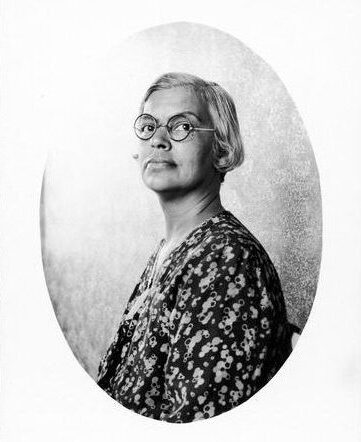
Lillie Rosa
Minoka-Hill
1976–1952
City: Fond Du Lac, Green Bay, Oneida
Lillie Rosa Minoka-Hill was the second Native American woman in the US to earn a medical degree and was the primary caregiver for the Oneida Reservation for many years.
Lillie Rosa Minoka was born on the St. Regis (now Akwesasne) Reservation in New York on August 30, 1876. Her mother was Mohawk, and her father was a white doctor. Her mother died shortly after giving birth, and her mother’s family raised her until age 5. At that time, her father brought her to live with him in Philadelphia, Pennsylvania. She went to a school for girls called the Grahame Institute, where she felt out of place with her white classmates. In 1895, she graduated from high school and planned to become a nurse. Her father said a woman of her education and class should become a doctor instead. Before enrolling in medical school, she spent a year studying French in a convent in Quebec, Canada. Her time there inspired her to convert to Catholicism.
In 1899, Minoka became the second Native American woman in the US to receive a medical degree when she graduated from Women’s Medical College of Pennsylvania, now part of Drexel University. After graduation, she interned at the Women’s Hospital and worked at public clinics in Philadelphia that served poor immigrants and Native Americans. Additionally, she worked at the Lincoln Institute, a Native American boarding school. She eventually went into private practice with a friend from medical school.
In 1905, she married an Oneida farmer named Charles Hill and moved with him to a reservation in Oneida, Wisconsin. At first, the two agreed she would not practice medicine because of her responsibilities at home and on the farm. However, her interest in medicine never lessened. Friends and neighbors would come to her with their health concerns, and she eventually decided to practice medicine again. Minoka-Hill learned how people on the reservation viewed healing, disease, and death. She learned traditional treatments to add to what she already knew about “white man’s medicine.” She treated patients in her “kitchen clinic,” but since she was not licensed in Wisconsin, she could not admit patients to the hospital, prescribe drugs, or charge fees. She worked with doctors in nearby Green Bay to provide these things.
Her husband died in 1916. She supported her family with money she inherited from her father. When the only licensed physician on the reservation left to serve in the Army during World War I and died in action, Minoka-Hill became the primary caregiver. She treated patients all day, often traveling long distances to make house calls. She accepted gifts of food and farm labor from patients. However, after the Great Depression hit in 1929, her inheritance ran out, and she needed a source of income. In 1934, she took the Wisconsin Medical Exam and became officially licensed. She charged patients based on what she knew they could afford. In 1946, Minoka-Hill had a heart attack that forced her to stop making house calls, but she continued to treat patients in her kitchen clinic.
In 1947, Minoka-Hill was named Outstanding American Indian of the Year by the Indian Council Fire, Chicago, and in 1949, she was awarded an honorary lifetime membership to the State Medical Society of Wisconsin. The Oneida Nation officially adopted her and gave her the name Youdagent (“She who serves”) in 1947. After Minoka-Hill died on March 18, 1952, the Nation built a monument in her honor with the inscription, “Physician, Good Samaritan, and friend of People of all religions in this community, erected to her memory by the Indians and white people.”
LEARN MORE
Apple, Rima D. “In Recognition Of… Lillie Rosa Minoka-Hill (1876-1952).” Women & Health 4, no. 4 (1980): 329-331. Accessed October 11, 2024. https://www.tandfonline.com/doi/pdf/10.1300/J013v04n04_01
Maurice, Jacquie. 2024. “Minoka-Hill, Rosa (1876–1952).” Encyclopedia.com. Accessed July 3, 2024. https://www.encyclopedia.com/women/encyclopedias-almanacs-transcripts-and-maps/minoka-hill-rosa-1876-1952.
Oneida Tribe of Indians of Wisconsin. 1989. “Oneida General Tribal Council recognition of Dr. Lillie Rosa Minoka Hill.” Accessed July 3, 2024. https://oneida-nsn.gov/wp-content/uploads/2016/02/09-29-89-A-Honoring-Dr.-Lillie-Rosa-Minoka-1.pdf
Profile drafted by Emma McClure, edited by Kelsey Foster and Amelia Stephens.
Photo courtesy of the Wisconsin Historical Society Archives, Image ID 10806.